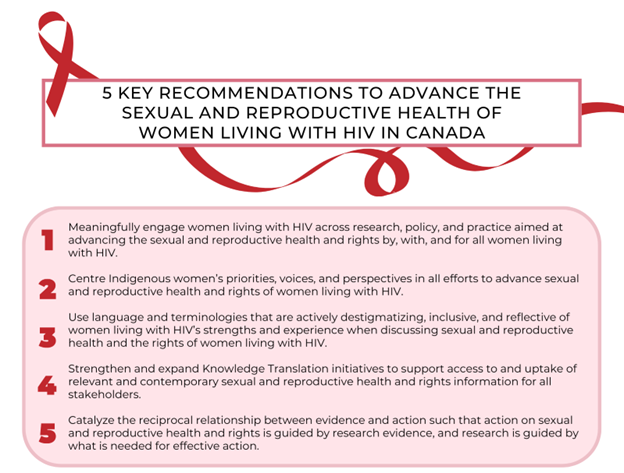Advancing the sexual and reproductive health and rights of women living with HIV
By Muluba, Angela and Zoe
I have been living with HIV my entire life. I spent 18 years watching my mother and my physician discuss me like I wasn’t there. This led to me turning 19, my mother dying and me not knowing how to navigate the health system. I’ll never forget, when I moved to a new city, being called by public health and berated. All in the name of “protecting the wider community”. Situations like this (and I’ve had many) lead to women living with HIV not receiving adequate care and giving up on finding it. - Muluba Habanyama
Muluba’s story is one familiar to many women living with HIV across Canada. Historically, women’s experiences and priorities have been under-represented in the HIV narrative, especially when it comes to their sexual and reproductive health and rights. However, there are ways that we can take action to change this narrative. The meaningful engagement of women living with HIV across research, programming, and policy is essential to supporting the sexual and reproductive health and rights of women living with HIV – in fact, this is the first recommendation set out in a national action plan to advance the sexual and reproductive health and rights of Women Living with HIV. Developed by a team of researchers, community advocates, clinical care providers, and global programming and policy-makers, this work is rooted in the principles outlined by World Health Organization’s Consolidated guideline sexual and reproductive health and rights of women living with HIV. It focuses on creating supportive environments that enable the autonomy and informed decision-making of women living with HIV. The key recommendations are below.
Figure 1. The five key recommendations to advance the sexual and reproductive health and rights of women living with HIV in Canada (Kaida et al, 2022)
Meaningful engagement means that everywhere decisions are being made about the health and rights of women living with HIV, women’s voices are not only included but valued – too often women living with HIV report being diminished and dismissed. Applying an intersectional lens to this recommendation is vital. Meaningful engagement requires that a diversity of perspectives and priorities are included, particularly when considering the intersecting systemic and structural forces that create inequitable outcomes across women living with HIV. For instance, among African, Caribbean, and Black (ACB) women in Canada, experiences of intersecting forms of stigma and racism combine to create greater HIV risk and consequence relative to white women.
When implementing these recommendations into our work and advocacy, we can refer to intersectional examples across Canada for best practices. Women’s Health in Women’s Hands is a community-health centre that provides primary care to racialized women and non-binary people from the African, Caribbean, and Black, Latin American, and South Asian communities in the Greater Toronto Area. A team of researchers, clinicians, and women living with HIV developed a model for supporting safer disclosure of one’s HIV diagnosis that prioritizes the safety and autonomy of the person disclosing, including careful consideration of the need to disclose. By centering the living experiences of ACB women in its development, this group created a framework for HIV disclosure that is sensitive to the intersecting social and legal impacts of disclosing a diagnosis – programming that responds directly to priorities of women living with HIV.
Looking forward, there are groups working toward addressing gaps in the national conversation and uplifting women living with HIV. WomenSpeak is building a national network by and for women living with HIV, a resource notably missing in Canada. This work is led by women living with HIV with a key goal of developing a women-centred version of the Greater and Meaningful Involvement of People Living with HIV and/or AIDS (GIPA and MIPA) principles and an anti-oppression framework.
Women living with HIV are leaders in this work, but the call to commit to meaningful engagement does not lie with one group alone. We invite everyone to confront inequities and support the sexual and reproductive health and rights of women living with HIV in Canada by committing to integrate the 5 Key Recommendations into practice and policy. Collective action based in evidence and intersectional approaches will transform supportive environments across Canada. Together, we can rise to the World AIDS Day 2022 challenge to “equalize” and make a tangible difference to the sexual and reproductive health and rights of all women living with HIV.
Article Details
Key recommendations for developing a national action plan to advance the sexual and reproductive health and rights of women living with HIV in Canada
Angela Kaida, Brittany Cameron, Tracey Conway, Jasmine Cotnam, Jessica Danforth, Alexandra de Pokomandy, Brenda Gagnier, Sandra Godoy, Rebecca Gormley, Saara Greene, Muluba Habanyama, Mina Kazemi, Carmen H. Logie, Mona Loutfy, Jay MacGillivray, Renee Masching, Deborah Money, Valerie Nicholson, Zoë Osborne, Neora Pick, Margarite Sanchez, Wangari Tharao, Sarah Watt, and Manjulaa Narasimhan
First published April 17, 2022
DOI: 10.1177/17455057221090829
Women’s Health
About the Authors




